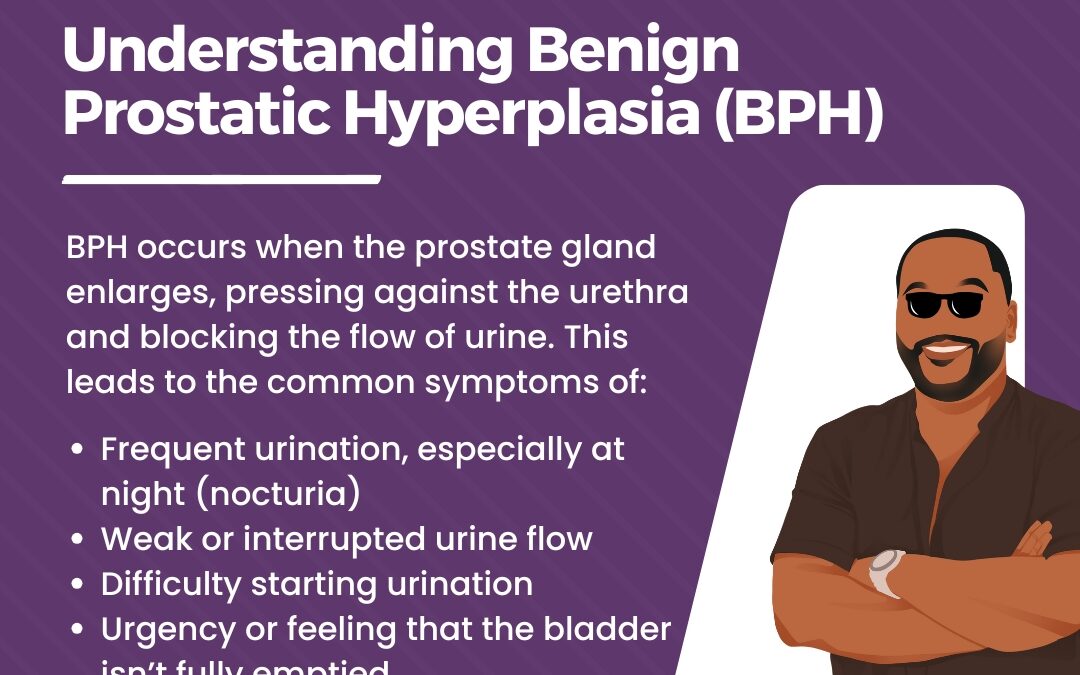Introduction:
When you’re diagnosed with Benign Prostatic Hyperplasia (BPH), it may feel like your life is suddenly under a microscope, but this common condition affects millions of men, especially those over 50. It’s important to know that BPH is non-cancerous and treatable, and understanding the condition is the first step toward managing it effectively.
What Is Benign Prostatic Hyperplasia (BPH)?
BPH occurs when the prostate gland enlarges, pressing against the urethra and blocking the flow of urine. This leads to the common symptoms of:
While it’s a natural part of aging for many men, managing it early can improve your quality of life significantly.
Understanding the Causes and Risk Factors
The exact cause of BPH isn’t fully understood, but several factors may contribute
- Age: BPH is more common as men age.
- Hormonal Changes: Increased levels of dihydrotestosterone (DHT), a hormone that plays a role in prostate growth, are linked to BPH.
- Family History: If your father or grandfather had BPH, you may be at higher risk.
Living with BPH doesn’t mean giving up on an active, fulfilling life. It’s all about taking control of your health.
Symptoms You Shouldn’t Ignore
It’s easy to dismiss symptoms like frequent urination as just part of getting older, but paying attention to these signs can help prevent more serious issues down the road. Key symptoms include:
- A frequent need to urinate, especially at night
- Difficulty starting or stopping urination
- A sensation that the bladder is never fully empty
- Weak urine flow or a delayed start to urination
If you experience any of these symptoms, don’t hesitate to consult a healthcare professional.
Taking Control of Your BPH: Tips for Managing the Condition
Once diagnosed, BPH can be managed with a combination of lifestyle changes, medical treatments, and in some cases, surgery:
Lifestyle Modifications:
- Reduce Fluid Intake: Try to cut back on liquids, especially before bed, to reduce nighttime urination.
- Healthy Diet: Eating a balanced diet rich in fruits, vegetables, and whole grains can support prostate health.
- Exercise Regularly: Maintaining a healthy weight and staying active can improve urinary function.
- Limit Caffeine and Alcohol: These can irritate the bladder and make symptoms worse.
Medication:
- Alpha Blockers: These medications relax the muscles around the prostate, easing symptoms.
- 5-Alpha-Reductase Inhibitors: These reduce prostate size over time by blocking the hormone responsible for prostate growth.
Surgical Options:
If medications aren’t effective, surgical treatments such as Transurethral Resection of the Prostate (TURP) can provide long-term relief by removing part of the prostate tissue.
When to Seek Help
If your symptoms start interfering with your daily life, it’s important to seek professional care. A urologist will work with you to assess your condition and recommend the best treatment options.
At Chiron Hospital’s Urology Department, we offer personalized care to help you manage BPH and any related urological concerns.
A Healthier Future with BPH
Living with BPH doesn’t have to mean suffering in silence. With the right approach, you can manage your symptoms and lead a comfortable life. Regular check-ups, lifestyle changes, and medical support are your tools for success.
Take Action Today
If you’re experiencing symptoms of BPH, don’t wait. Reach out to Chiron Hospital’s Urology Clinic for a thorough evaluation. We’re here to guide you through every step of your treatment journey, ensuring you feel supported and informed. Call us at +234 909 000 1078 or email admin@chironhospital.org to book your appointment today.


Recent Comments